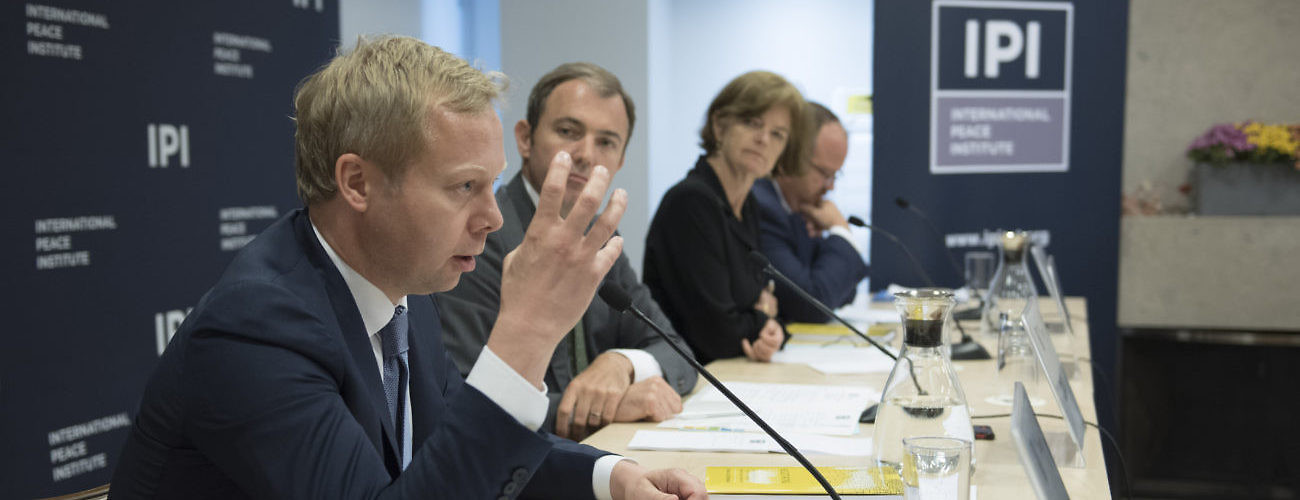IPI was the scene, on September 28th, of a lively discussion among senior United Nations mediators and the author of a new book called Negotiating Peace: A Guide to the Practice, Politics, and Law of International Mediation.
The author was Sven M. Koopmans, a past member of UN and European Union mediation teams, international lawyer, academic, and current member of the Dutch Parliament.
The book cites examples from around the world, with an emphasis on the conflicts of the last 25 years, including peace processes in places where Dr. Koopmans was himself involved like Cyprus, Darfur, Kosovo, Mali, South Sudan, Syria, Ukraine, and Guyana/Venezuela.
In introductory remarks, Stef Blok, the Minister of Foreign Affairs of the Netherlands, praised the book for capturing the complexity of international mediation and not settling for easy answers.
“This book does not give the answer to negotiating peace. That’s because it isn’t an exact science,” he said. “It is, for this very reason, that what is contained in the pages of the book is so valuable. Answers have to be sought again every time because every conflict is different, and we must continue to learn from history, assess relevant options, understand law, and utilize a pragmatic approach so we can continue to negotiate sustainable peace.”
Dr. Koopmans said he had had a chance recently to meet the Dalai Lama, who in answer to a question about the most effective way to make peace, had told him, “‘We have to find peace in ourselves, because peace lies within all of us,’ I thought…that’s a very inspiring message, but it doesn’t yet bring peace.”
Necessary, he said, was a plan and a determination to stick to it despite setbacks or digressions. “The most important thing is to have a plan,” he said. “Your plan may not always succeed, in fact, it is very likely not to succeed, but you can learn from failure. At least if you have a plan, you have something to strive towards.”
He said that having a plan was important because it gives the process a sense of direction. “If you don’t have a plan, then there is always a reason to wait, there is always…an election soon, or maybe somebody else will come to power that will have an arms shipment, or maybe we should wait for the next seminar,” he said. “At the same time, if you don’t have a plan, everything is urgent, because something has just happened.”
He said he particularly remembered working with former Secretary-General Kofi Annan on the continually failing effort to bring peace to the divided island of Cyprus. “The Annan Plan for Cyprus didn’t quite work, but at least he had a plan, and he tried,” he said. “We cannot all be Kofi Annan, I think nobody can, but we can all try to learn from his successes and from his failures, and if we learn from those things, then maybe we can go just that little step beyond just finding peace in yourself.”
Robert Dann, chief of Political Affairs in the office of the UN Special Envoy for Syria and former Chief of the Mediation Support Unit in the UN Department of Political Affairs, said, “Sven is correct that if you don’t have a plan every road leads nowhere in mediation. If you are a cork bobbing up and down on the ocean of conflict, you just get washed this way and that, and the art of being a good mediator is to have some sort of a strategy which you change a lot, which you change all the time, but to have a North Star that you are moving towards within, and that each action that you take is moving towards a particular goal.”
He said that it was important to know when there was a consensus for moving forward and when not, but stressed that the mediator had to maintain the confidence of the parties while selflessly letting them move at the speed they felt most comfortable with. “The mediator is often a bridge that the parties need to walk on or walk over,” he said. “Ego is not the issue in the process, and the ego of the institution is not the issue in the process.”
Theresa Whitfield, Director, Policy and Mediation Division, UN Department of Political Affairs, said she found the book “admirably short, concise, and accessible” but felt it didn’t probe enough the frequent tension between those seeking justice and those seeking peace. She also faulted it for not taking into account the importance of the “meaningful participation of women in peace processes.”
“There’s also the gendered approach to conflict. Sven addresses this, I’m not saying he doesn’t, but the section on gender doesn’t come until page 193 of a 200-page book, which I think is a little late,” she said. “Especially as all the UN envoys certainly now know that they’re having to grapple with these issues at the beginning of the process.”
Terje Rød-Larsen, President of IPI and himself a past peace negotiator, made welcoming remarks, and Adam Day, Head of Programmes, Centre for Policy Research, the United Nations University, moderated the discussion.








